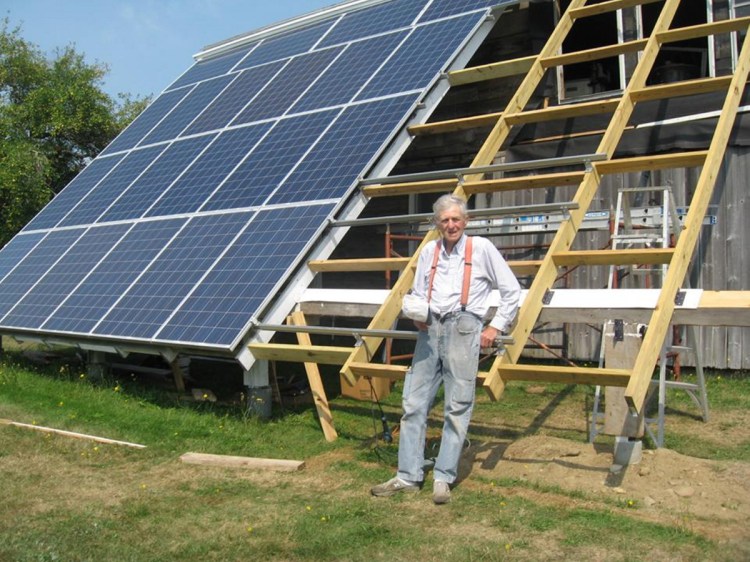If you can spare a moment we will consider basic economics, rhubarb and electricity. The day being Tuesday, I went to the town dump with the Saturday night Grange supper garbage bags.
Visiting a first-class dump is always an exercise in multi-tasking. This time I got half a dozen boards 6 feet long and 3 inches wide. They were good boards, although I didn’t need good boards but six sticks to make two tripods.
Only on Facebook would I need to explain the math. I also scavenged a board about 2 feet long and about 10 inches wide.
My 94-year-old friend Mr. Bent helped me build two tripods and screw the flat wide boards on top as platforms. On top of the two platforms we screwed down my sprinklers. When the sun goes down, I’m going to water my rhubarb crop because on the coast of Maine, although it might be cold and overcast, we get next to no rain all summer and the ground is always bone dry.
This is why you see so many plastic flowers in Maine graveyards.
I’d like to use three sprinklers, but two are about all the pressure on my present system can handle. The water comes from a deep-drilled well. Electricity is no problem. I generate my own power, so no matter how much electricity I use to water my rhubarb, my monthly bill is 10 dollars and change for the convenience of being hooked to the grid.
Most of my friends pay at least twice that – $20 or more every month for their electricity – but back around 2009, while at the WERU fair in Blue Hill, I met a man named Charlie who told me about solar panels. It sounded good to me and before long one of his friends named Rich Komp showed me how to make my own. I had over a dozen of them before I discovered that although they were great for an off-grid battery system, the little sine waves didn’t jump the right way to satisfy Central Maine Power.
I went up to Liberty and asked John Luft at ReVision Energy what I should do. I told him I had built a huge rack on the side of my henhouse to hold up my homemade panels. When he came down to survey the situation he probably wondered what was holding up the henhouse. Because I had already done all the heavy lifting, and because they were working on the ground, John’s crew was able to hook up six 230-watt panels for me within a couple of hours.
That was my solar starter kit.
What too many people don’t understand about saving money with solar panels is that you can easily put up your own and you don’t need to buy them all at once. Once I saw how simple it was to bolt the panels to an aluminum rack, every time I’d scrape enough money together I’d get eight more panels and, with the help of a young, rugged friend, bolt them to aluminum racks. My friend Mike, who is a licensed electrician with a lot of solar power experience, plugged them into the grid for me and helped me get through the paperwork with CMP.
Now I have 30 panels. When I put up the last eight, I was 78 years old and had Lyme disease so bad I could barely think or walk. I only mention this to stress that installing solar panels does not require a mathematically oriented mind or a body able to leap tall buildings at a single bound.
As I write, my elderly friend Mr. Bent is upstairs, enjoying a moment of respite after a day well spent in the rhubarb patch. He is playing “Tell Aunt Rhody” on his fiddle. Many years ago, he severed a critical finger at the knuckle, which enables him to generate an ambivalent tonality that would have given Shostakovich goose pimples.
My father used to sing his own version of this beautiful old ballad to me when I was a babe in arms 80 years ago. Just hearing it being played in the room above fills my eyes with tears of nostalgia.
“… Tell Aunt Rhody the old cat’s dead.
“Now she is molding, down there in the ground
“Now she is rotting in her grave.”
From time to time someone asks me when my solar panels will pay for themselves. That’s an easy one – long before people who pay $20 a month for electricity ever see a return. The money they shell out every month is gone. Mine waters my rhubarb.
The humble Farmer can be heard Friday nights at 7 on WHPW (97.3 FM) and visited at his website:
Send questions/comments to the editors.



Comments are no longer available on this story